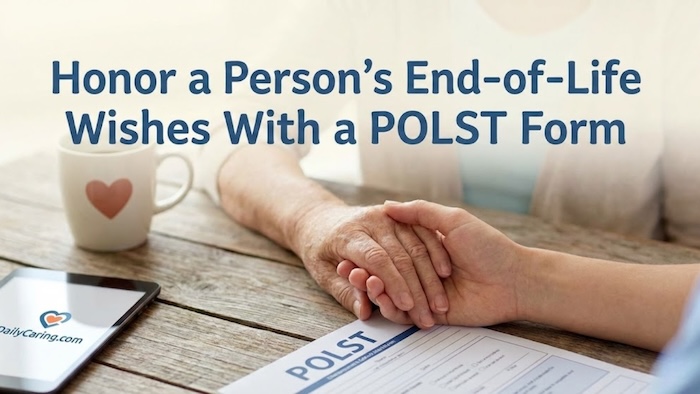
Discussing end-of-life wishes benefits seniors and caregivers
It’s hard to think about end of life, especially when your older adult isn’t at that stage, but it’s critical to prepare for it ahead of time.
Understanding your senior’s wishes before a health crisis means that you and the rest of the family won’t be forced to make those difficult choices in the middle of an emergency. A living will helps you understand and legally document your senior’s wishes for end-of-life care.
Studies have shown that older adults often feel relieved after sharing their end-of-life wishes. It’s usually because they have specific preferences or don’t want to burden their families with those decisions.
What is a living will?
A living will is a legal document that lets a person state their wishes for end-of-life medical care. Family members and doctors use it to make decisions about medical treatments when that person can’t communicate or make decisions for themselves.
A living will can also be called an advance directive or a healthcare directive.
How does a living will work with a Power of Attorney?
A living will expresses end-of-life wishes and typically works together with a medical Power of Attorney (POA). In some states, they’re combined into one document.
The medical POA allows your older adult to choose someone to legally make medical decisions on their behalf. That person is called the healthcare agent or proxy for healthcare decisions.
With these two documents, your senior can control the types of treatment they’ll receive at the end of their life and who will make sure their wishes are carried out.
What’s included in a living will?
A living will spells out the medical treatments your older adult would and would not want to have.
Decisions in a living will usually include preferences for:
- CPR / resuscitation to restart the heart if it stops beating
- Mechanical ventilation to take over breathing if they’re unable
- Tube feeding if they can’t eat or drink, either by IV or tube in stomach
- Dialysis if their kidneys no longer work
- Antibiotics or antiviral medications to treat infections
- Comfort care (also called palliative care), which basically means keeping them comfortable and as pain-free as possible – it could mean dying at home, getting pain medications, being fed ice chips for a dry throat, or avoiding invasive tests or treatments
- Organ and tissue donations for transplantation
- Donating their body for scientific study
How does a living will help seniors and caregivers?
A living will helps you and your family make decisions about your senior’s care. If you don’t know their specific end-of-life wishes, you’ll have to make a best guess – a very stressful situation! Even worse, family members might end up arguing over treatments.
Also, if an older adult wants their unmarried partner or trusted friend to be in charge of their medical decisions, they must have a living will and medical POA in place. Otherwise, doctors won’t even be able to talk with them about medical decisions.
Different states have different laws for living wills
Living wills aren’t the same in all states. For example, in California, it’s called an advance directive and includes both a living will and a medical POA.
Whether you complete the forms yourself or use a lawyer, your senior needs to use the living will for their state. The National Hospice and Palliative Care Organization provides links to each state’s living will form and instructions.
Bottom line
A living will makes sure that your older adult’s wishes will be honored and often puts their minds at ease. If your senior is already incapacitated, talk with siblings or family to make decisions on their behalf and clearly document them.
Having these conversations and thinking through important decisions before a crisis prevents additional stress, guilt, and conflict during already difficult times.
Next Step Find your state’s advanced directive and instructions
You might also like:
— The Five Wishes Living Will Makes End of Life Easier
— 5 Important Legal Documents for Caregivers
— POLST vs Living Will: What’s the Difference?
Image: Alzheimer’s Care Specialists
About the Author

Connie is the founder of DailyCaring.com and was a hands-on caregiver for her grandmother for 20 years. (Grandma made it to 101 years old!) She knows how challenging, overwhelming, and all-consuming caring for an older adult can be. She also understands the importance of support, especially in the form of practical solutions, valuable resources, and self-care tips.












I love your website! Do you have plans to have it available in Spanish? This would be great for many of my Spanish speaking clients and their families.
Thanks, we’re so glad our articles are helpful! Unfortunately, we aren’t able to offer our articles in Spanish at this time.
Can you please translate this important information to Spanish language?
So glad this is helpful! We hope to translate our site into different languages in the future.
I am not going through dementia or alzheimers, but it has been in my family. I am not healthy and I am currently more depressed than I thought possible. I will be getting part time care givers who only do it for the money. I just want to read everything I can to hopefully make me feel better.
It’s great that you’re being proactive and learning as much as you can. That will be a big help as you think about what you might need for your future care. However, it’s important to remember that even if people in your family have had Alzheimer’s or dementia, it doesn’t mean that you will also have it.
[…] Daily Caring. Daily Caring is a clean, lovely straightforward website with a comprehensive set of articles on topics ranging from Medicare and Medicaid to finding home care. I particularly like that each content piece is short and to-the-point. […]